TRADITIONAL FORMS OF COOPERATION BETWEEN FAMILY FARMERS OF NOSSA SENHORA DA GLÓRIA
DOI:
https://doi.org/10.35977/0104-1096.cct2012.v29.14548Abstract
This article aims at discussing the forms of agricultural and non-agricultural cooperation practised by the family farmers of the municipality of Nossa Senhora da Glória, state of Sergipe, Brazil, mainly until the end of the 1970s, seeking to understand why the traditional forms of cooperation – referred to by family farmers as batalhão, pisada, taipa de casa, ferra and pega de boi – were almost extinct, and how the relationships between the family farmers who are settled in the municipality are going nowadays. The methodology used in the study was the field research with 118 family farmers associated and non-associated with formal organizations in 57 villages of the municipality. It can be observed that the traditional forms of cooperation disappear as the State starts demanding that the organization of the farmers occurs through community development associations, as a condition for the implementation of public politics aimed at the development of rural communities. It was also found that the changes in the landscape of the municipality agroecosystems contributed to the weakening of traditional forms of cooperation.Downloads
Published
2012-01-01
How to Cite
Azevedo, J. F. de, Mota, D. M. da, & Franco, J. T. (2012). TRADITIONAL FORMS OF COOPERATION BETWEEN FAMILY FARMERS OF NOSSA SENHORA DA GLÓRIA. Science & Technology Journals, 29(1), 195–212. https://doi.org/10.35977/0104-1096.cct2012.v29.14548
Issue
Section
Artigos


